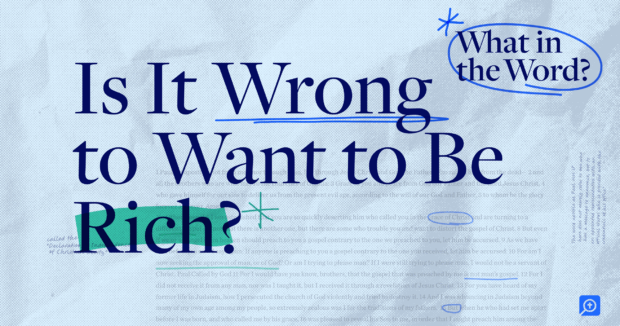On this episode of What in the Word?, Malcolm Foley joins Kirk E. Miller to debate the difficult passage of 1 Timothy 6:6–10. Collectively, they unpack Paul’s warnings concerning the need for wealth and take into account how the love of cash is described as a root of all types of evil.
Dr. Foley—pastor, scholar, and creator—helps us suppose biblically about wealth, contentment, and the way the church can resist the cultural pull towards materialism.
Observe the present on YouTube, Spotify, Apple Podcasts, and extra.
Particular affords


A Free Guide Only for You
Logos has given away over 5 million free books, empowering Christians globally to check deeply. Get a shiny, new free e book each month!


Unique Lexham Press Robust Texts Bundle
Have extra questions concerning the Bible? Get the 10-volume Lexham Press Robust Texts Bundle designed solely for followers of What within the Phrase?
Join with us
Prepared to extend biblical literacy? Like and share. To go the additional mile, go away us a evaluate in your most well-liked platform.
Subscribe to get future episodes. (Bonus: We’ll ship you a reduction to make use of in your first buy.)
Thanks for subscribing to Phrase by Phrase!
Use code WORDBYWORD to save lots of 10% in your first order.
WORDBYWORD
Copy code
Episode visitor: Malcolm Foley
Dr. Malcolm Foley holds a level in spiritual research with a second main in finance and a minor in classics from Washington College in St. Louis. He accomplished a MDiv at Yale Divinity College, specializing in the theology of the early and medieval church. He has a PhD in Faith from Baylor. He pastors Mosaic Waco in Waco, TX.
Malcom is creator of Anti-Greed Gospel: Why the Love of Money Is the Root of Racism and How the Church Can Create a New Way Forward (Brazos, 2025).
Episode synopsis
What’s the difficulty?
Kirk E. Miller and Malcolm Foley focus on 1 Timothy 6:9, the place Paul warns that “those that need to be wealthy fall into temptation.” Collectively, they discover whether or not wanting wealth is inherently sinful, how this passage connects with the broader instructing of Scripture, and what sensible implications it carries for believers at present.
Kirk and Malcolm notice that the problem with this passage just isn’t essentially interpretive—it’s comparatively easy in that means—however reasonably in its software. Wealth is one thing many individuals need. The discomfort then comes from the textual content difficult frequent assumptions and practices, particularly in prosperous cultures.
Context of 1 Timothy 6
The dialogue begins by setting the scene: Paul writes to Timothy to warn in opposition to varied pitfalls in church leadership, notably the misuse of godliness as a path to non-public acquire (1 Tim 6:5). In distinction, Paul stresses that “godliness with contentment is nice acquire” (6:6), urging Christians to deal with Christian maturity reasonably than materials prosperity. The reminder that “we introduced nothing into the world and might take nothing out” (6:7) reinforces the theme of radical contentment.
Kirk factors out that the passage ties into broader considerations about false instructing at each the start and finish of 1 Timothy, framing the epistle inside a constant warning in opposition to those that distort Christianity for egocentric acquire. As an example, see Robert Yarbrough’s chart exhibiting how the top of 1 Timothy remembers issues addressed initially:
| Opening (1 Tim 1:3–20) | Closing (1 Tim 6:2–21) |
| Cost to remain at Ephesus (1:3) | Cost to show and uphold the religion (6:2) |
| False lecturers and commendation of affection (1:4–7) | False lecturers and commendation of godliness (6:3–6) |
| Correct use of the OT regulation (1:8–10) | Correct regard for cash (6:7–10; see additionally vv. 17–19) |
| Testimony: Paul was saved by Christ, not regulation (1:11–16) | Attraction: Timothy ought to lay maintain of everlasting life in Christ, who additionally made the nice confession (6:11–15) |
| Doxology (1:17) | Doxology (6:15–16) |
| Software: Cost to Timothy confirmed, with warning relating to those that have rejected the religion (1:18–20) | Software: Cost confirmed to the rich below Timothy’s management and to Timothy himself, with warning relating to those that have rejected the religion (6:17–19) |
Evaluating Paul’s instructing with Jesus’s
Paul’s warning in opposition to need for wealth in 1 Timothy 6 displays Jesus’s teachings in the gospel. Within the gospels, Jesus usually current robust warnings in opposition to materialism:
- As a substitute of laying up treasure on earth, we’re to build up treasure in heaven (Matt 6:19–21) by promoting what we now have to supply for the needy (Luke 11:33–34).
- Jesus warns that life doesn’t consist of fabric possessions (Luke 12:15). As a substitute, we pray for our each day bread (Luke 11:3).
- Think about additionally the parable of the sower, the place the “cares and riches” of life choke the phrase (Mark 4:18–19).
Historical past of interpretation
Malcolm explains that early Christian theologians corresponding to Basil of Caesarea and others from monastic backgrounds interpreted these warnings strictly, usually advocating renunciation of wealth. Over time, particularly post-Constantine, Western Christianity noticed rising makes an attempt to justify wealth. Whereas the biblical message about wealth remained clear, its software turned extra diluted as Christians collected energy and possessions.
Malcolm factors out that wealth usually removes the sense of dependence on God, which Scripture constantly frames as important to faithfulness.
Paul’s warning in 1 Timothy 6:9
The textual content emphasizes that those that “need to be wealthy” don’t merely danger temptation however fall into it. The phrase “fall” signifies an precise, not simply potential, expertise of one thing—just like the person who “fell amongst robbers” in Luke 10:30.
Three progressively worsening risks accompany this fall:
- Temptation
- A snare (entice)
- Mindless and dangerous needs
These in the end plunge individuals into “wreck and destruction.”
Thus, the passage doesn’t current a cautious “if you wish to be wealthy, that’s superb; simply watch out of its temptation” tone, however reasonably a powerful “don’t need to be wealthy” warning.
What does it imply to be wealthy?
In fact, one can simply lax this warning primarily based on how they outline what it means to be “wealthy.” So what does Paul imply by “wealthy”?
Importantly, Paul frames this need for wealth in distinction to contentment (1 Tim 6:6–8). And to be content material, Paul says, is to be happy with mere “meals and clothes” (1 Tim 6:8). The choice is to need greater than this, to lack contentment and need wealth.
The love of cash (1 Tim 6:10)
Verse 10—”the love of cash is a root of all types of evil”—is among the most incessantly quoted verses within the Bible. Malcolm notes that though there’s a debate over whether or not it must be “the root of all evil” or “a root of all kinds of evil,” the context helps the concept that love of cash results in an enormous vary of sins.
Malcolm stresses that love of cash capabilities in its place “grasp” in competitors with God—echoing Jesus’s instructing that nobody can serve each God and mammon (Matt 6:24).
What about rich people in Scripture?
Some may argue that examples like Abraham and Job complicate this strict warning in opposition to wealth. Malcolm clarifies:
- The problem just isn’t wealth itself however the pursuit and hoarding of it. Abraham and Job had been rich, however they didn’t pursue wealth as their purpose.
- Moreover, Scripture critiques kings like Solomon who amassed extreme wealth in opposition to God’s instructions (see Deut 17:17).
- Importantly, Paul acknowledges the truth of rich Christians later in 1 Timothy 6:17–19, offering particular directions for them reasonably than condemning their existence.
Paul’s directions to the wealthy (1 Tim 6:17–19)
Paul instructs the wealthy to:
- Keep away from pleasure
- Keep away from setting their hope on wealth
- Set their hope on God, who “richly gives us with every thing to get pleasure from”
- Be wealthy in good works
- Be beneficiant and keen to share
- Retailer up treasures for the longer term (treasures in heaven)
The play on phrases all through are placing: true riches lie not in materials possessions however God who richly gives and permits us to be wealthy in good works, like generosity.
Sensible software for Christians & church buildings
Malcolm urges believers to reframe their considering round wealth:
- Commonly ask: “What do I really want?”
- Goal to match or exceed spending on oneself with giving to others
- Domesticate habits of sharing reasonably than hoarding
- Resist the cultural narrative of self-sufficiency and embrace Gospel-centered dependence
Native church buildings ought to foster two cultures:
- Asking for assist: Lowering stigma round monetary want.
- Proactive generosity: Viewing all possessions as instruments for blessing others.
Kirk and Malcolm tie this to the New Testomony’s description of the early Christian communities by which members offered their possessions and contributed to the wants of others (e.g., Acts 2:42–47; 4:32–37; 6:1–7; 2 Cor 8; 1 Tim 5:3–16).
The Gospel impulse for generosity
In the end, resisting the need to be wealthy and embracing radical generosity is rooted within the gospel: Jesus, although wealthy, turned poor so believers may change into wealthy in him (2 Cor 8:9). Christ shares his very throne along with his individuals (Rev 3:21). As a result of Christ shares every thing with us, we’re liberated to share freely with others.
Malcolm emphasizes that the generosity of the gospel basically reorients believers’ relationships with their possessions.
Logos values considerate and interesting discussions on vital biblical matters. Nonetheless, the views and interpretations introduced on this episode are these of the people talking and don’t essentially replicate the official place of Logos. We acknowledge that Christians might maintain totally different views on this passage, and we welcome various engagement and respectful dialogue.
Source link












